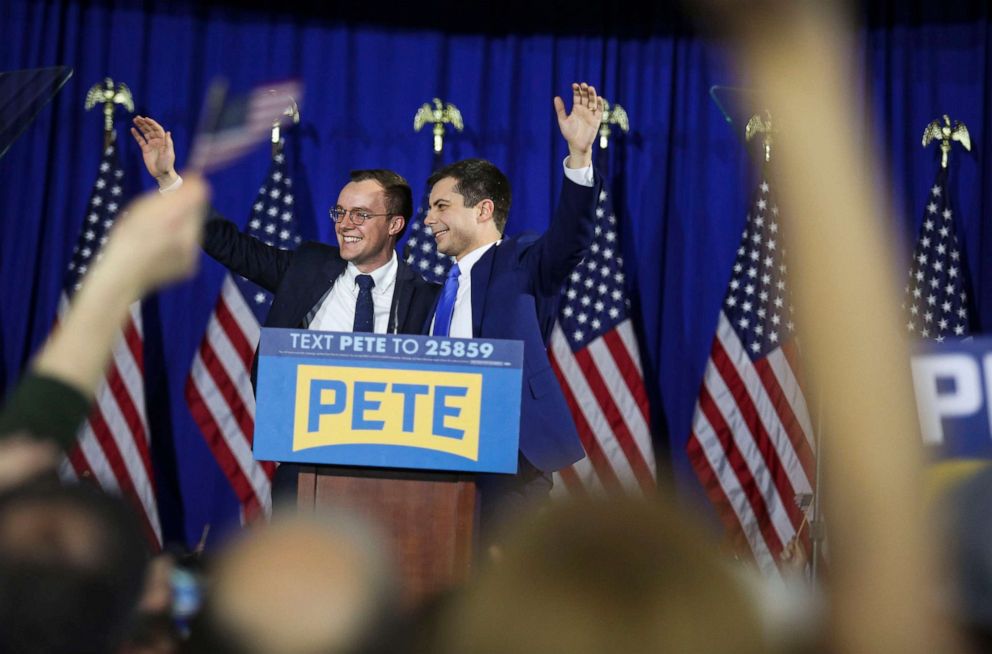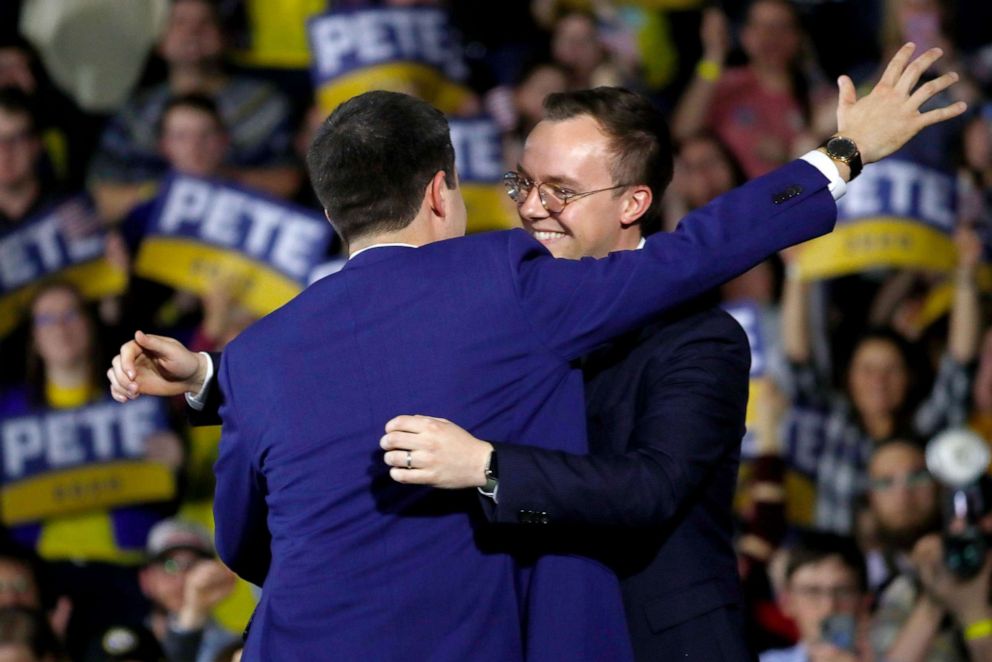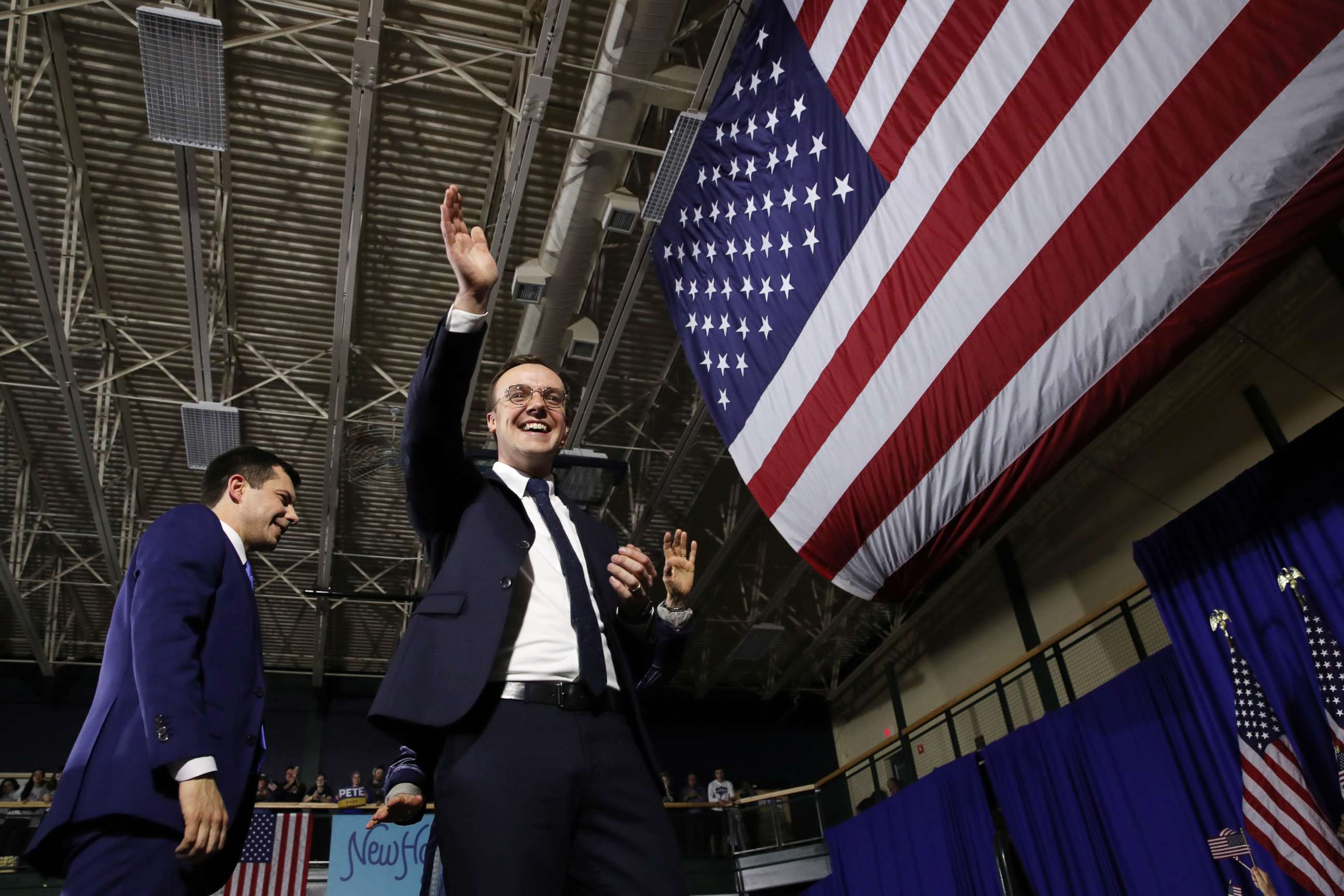Pete Buttigieg's husband responds to critics, discusses historic nature of presidential campaign
Chasten Buttigieg spoke about life on the campaign trail and Rush Limbaugh.
For Chasten Buttigieg, it was a "culmination of experiences" that led him to fall for Pete Buttigieg, the mayor of South Bend, Indiana, in 2015. Unbeknownst to him at the time, his future husband would become a top-tier presidential candidate for the Democratic Party.
"He made me feel so loved right away," Chasten Buttigieg, 30, told ABC News' Linsey Davis as part of the ABC News Live series "Running Mates."
He said that it was Pete Buttigieg's heart that made him fall "hard and fast."
The two met on the dating app Hinge in the summer of 2015, Chasten Buttigieg said, before revealing what initially caught his attention on his husband's profile.
"I won't lie, it was the picture of him in the military," Chasten Buttigieg said with a smile and a laugh. "I'll tell the truth."
During a town hall in Sacramento, California, on Valentine's Day last week, Pete Buttigieg spoke openly about what made him fall in love with Chasten.
"First, I just saw these eyes, this smile, [that] I just had to see in person," Pete Buttigieg said. He recalled their first date in South Bend, during which the two first met for a beer. Then, it turned into dinner and eventually a baseball game and walk around town, he said.
"I didn't want it to end. And what I saw was somebody who is so alive to the way in which we can lift one another up, and you got to understand, I had been avoiding, I mean, actively avoiding love for a very long time," Pete Buttigieg said. "And [I] tiptoed out to see what it would be like, and met this extraordinary person who let me know what it meant to care about somebody else and lift them up, too, and reminds me every day of the opportunity by holding office even just by being a candidate to make sure others feel seen, and to make sure others know that they're important."

The two married three years after meeting at the then-Mayor's hometown. Chasten Buttigieg explained why he decided to take his husband's last name.
"I just want our kids to have the same last name, and this is probably going to sound really funny, but I really like the name Buttigieg," he said.
They were married for less than a year before Pete Buttigieg decided to run for president. As newlyweds, Chasten Buttigieg admits "there's no denying" their time apart has been hard on their marriage.
"But it is a sacrifice that's worth making because I have seen Peter go out there and change people's lives, saved people's lives because of the visibility of this campaign and because of the message that he's offering the American people. A message of hope and inclusion and belonging. … So I'm very proud to share him with the rest of the country," Chasten Buttigieg said.
Chasten Buttigieg was a middle school drama teacher before he decided to join his husband on the campaign trail full-time. He's now become a powerhouse player for the campaign, holding fundraisers of his own and amassing hundreds of thousands of followers on Instagram and Twitter in an effort to support his husband.
"I can connect with people," Chasten Buttigieg said. "As a person who came out in a country that made LGBTQ Americans feel disgusting and unwanted and unloved, I know what it's like to feel like this country doesn't stand for you."

To hear two men affirm their love for one another so openly in a presidential campaign is groundbreaking and historic. Pete Buttigieg is the first major openly gay candidate to launch a bid for the presidency, and with voting underway, he's currently leading the Democratic field in delegates.
"Iowa, you have shocked the nation," Pete Buttigieg said on the night of the Iowa caucuses earlier this month after declaring an early victory.
Pete Buttigieg also went on to finish second in the New Hampshire primary, which Sen. Bernie Sanders won.
At his side during both election night celebrations was Chasten Buttigieg, who could be seen beaming from the side of the stage, watching his husband deliver a speech to hundreds of supporters, and eventually making his way on stage to embrace the former mayor with a hug.
Recently, Pete Buttigieg was the target of homophobic attacks from conservative radio show host Rush Limbaugh, who speculated if a gay man could beat President Donald Trump.
"America's still not ready to elect a gay guy kissing his husband on the debate stage president," Limbaugh said.
Pete Buttigieg shot back at a CNN town hall in Nevada this week.
"The idea of the likes of Rush Limbaugh or Donald Trump lecturing anybody on family values. I mean, I'm sorry, but one thing about my marriage is it's never involved me having to send hush money to a porn star after cheating on my spouse with him or her. So they want to debate family values? Let's debate family values. I'm ready," Pete Buttigieg said.
Chasten Buttigieg said he's "dealt with a multitude of Rush Limbaughs" over the course of his life and is more than confident that his husband "is ready to go toe-to-toe with this president."
"Pete can take on the likes of Rush Limbaugh. But I'm more worried about the kids. I'm more worried about the people in this country who are watching how we treat this candidacy, treat this campaign and the way we treat people who for so long have been attacked by people like Rush Limbaugh and this president," Chasten Buttigieg said.
"I think it is time for moral leadership to be restored to the White House," he continued. "So when you are ready to share that deepest truth about yourself, when you are ready to step out of the closet, you step out into something hopeful and inclusive and you look up to Washington and you see a president who cares about you and loves you."

Growing up in rural Michigan, Chasten Buttigieg's ascent to what could be the nation's first "first gentleman" was not always easy.
"I grew up in a pretty socially conservative place. … I went to a school where, you know, if you weren't on the football team or one of the jocks that, you know, you were picked on and bullied and belittled," he said.
Being gay made things even harder for him. When he came out to his family during the summer after his high school graduation, he ran away and became homeless.
"When I came out, I was certain that I'd lose everything," Chasten Buttigieg said. "I was so certain that I would be a disappointment to my family and my community and my church and my friends that rather than stick around and find out if I was going to be OK, I ran away from it. Sometimes I slept on my friend's couches and floors, and sometimes I felt like I was a burden even on my friends. And so, I would just sleep in the back of my car."
But Chasten Buttigieg says he's careful about telling his coming out story and what ensued to other people. His story, he said, is a lot different from other people's.
"I have a happy ending to that story. I got to go home. I got to go home to two loving parents who were terrified for me because they loved me. But they knew it was gonna be hard. And I'm very, very lucky. Not every kid has that story," he said.
It was his own experience that has shaped Chasten Buttigieg's work as an advocate for LGBTQ youth. Just this week he announced that he's visited close to 100 LGBTQ equality centers and homeless service providers, where he was able to share his story and listen to those of kids from all over the country,
Chasten Buttigieg says this election is not about policy. From homelessness to health care to the #MeToo movement, for him, it's personal.
Previously, Chasten Buttigieg has only briefly been able to talk about a time when he claims he was sexually assaulted as a teenager. He said that the person who took advantage of him was a friend of his friends and that he didn't think they'd believe him if he told them.
He told Davis that sharing a story like this "requires you to be so vulnerable," and that when it happened to him, in a way he "was terrified of feeling vulnerable and terrified of telling my friends and my family."
"I was young. I was 18. And I remember somehow feeling like my parents would be so disappointed in me and I don't know what it was about society that made me feel somehow that I had done something wrong," Chasten Buttigieg said. "And to feel such shame and guilt for somebody else taking advantage of me. And I'm so grateful for everyone who has spoken up because it made me feel less alone, too. As somebody who held on to that for a really long time, and unfortunately, that shaped me in a really negative way [with] trying to open up to love."
Chasten Buttigieg said he shared his story with his husband very early in their relationship. "It was the first time I really felt like someone got it, and understood how difficult maybe a touch on the shoulder could be for somebody who had that experience," he said.
Through the ups and down of the campaign trail, and the amount of time away from each other, Chasten Buttigieg said his husband never lets him forget how loved he is.
"He's really good at that. He is really good at taking the time to write out a little poem or a little letter, and he's also deeply reflective and he'll write a story that I'd completely forgotten about," Chasten Buttigieg said, giving an example. "'Do you remember that time we sat at a cafe in Paris and watched the world go by? And I know it's crazy out there right now. But, you know, when you're far away and you're missing me, you think of that moment.'"
Even if his husband doesn't go on to win the presidency in 2020, Chasten Buttigieg strongly believes that the campaign has made an impact nevertheless.
"I obviously want [him] to be president," Chasten Buttigieg said. "But if for some reason it doesn't work out, I will not for one moment hang my head in shame."




